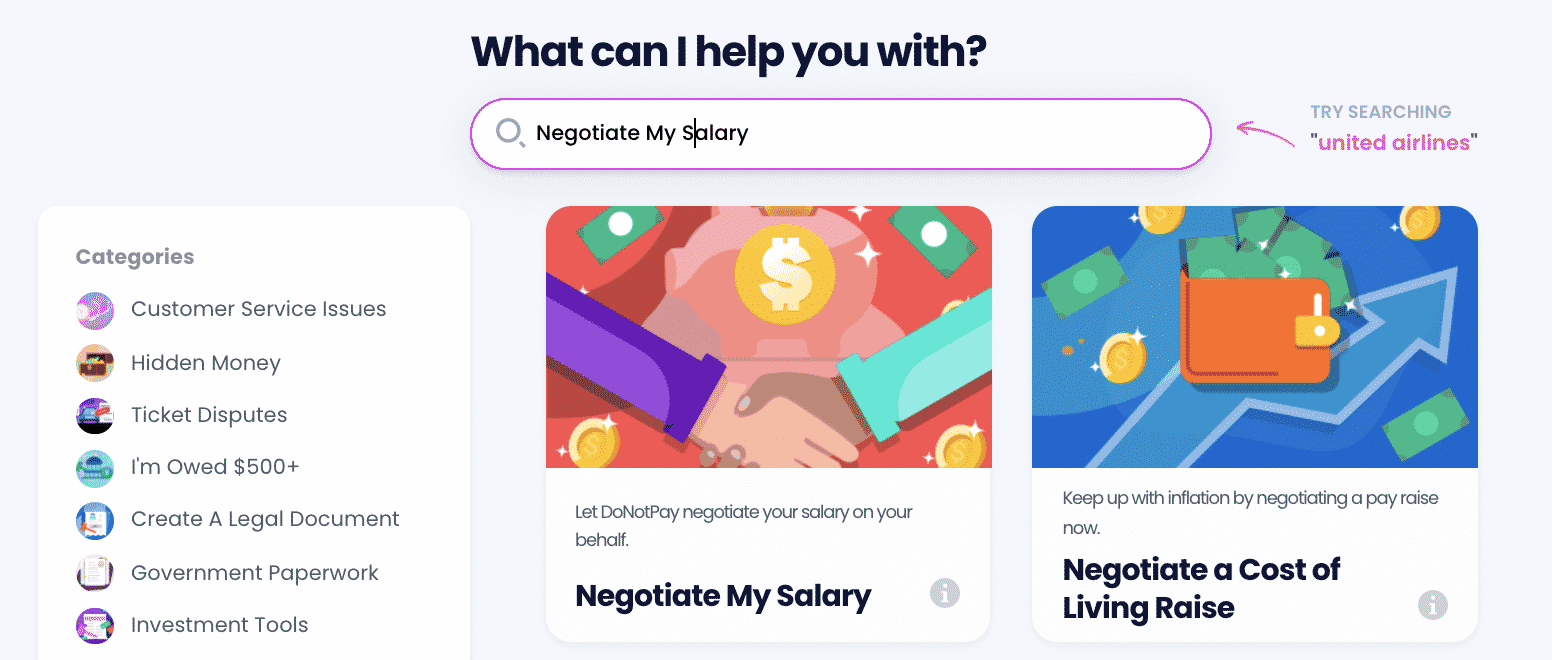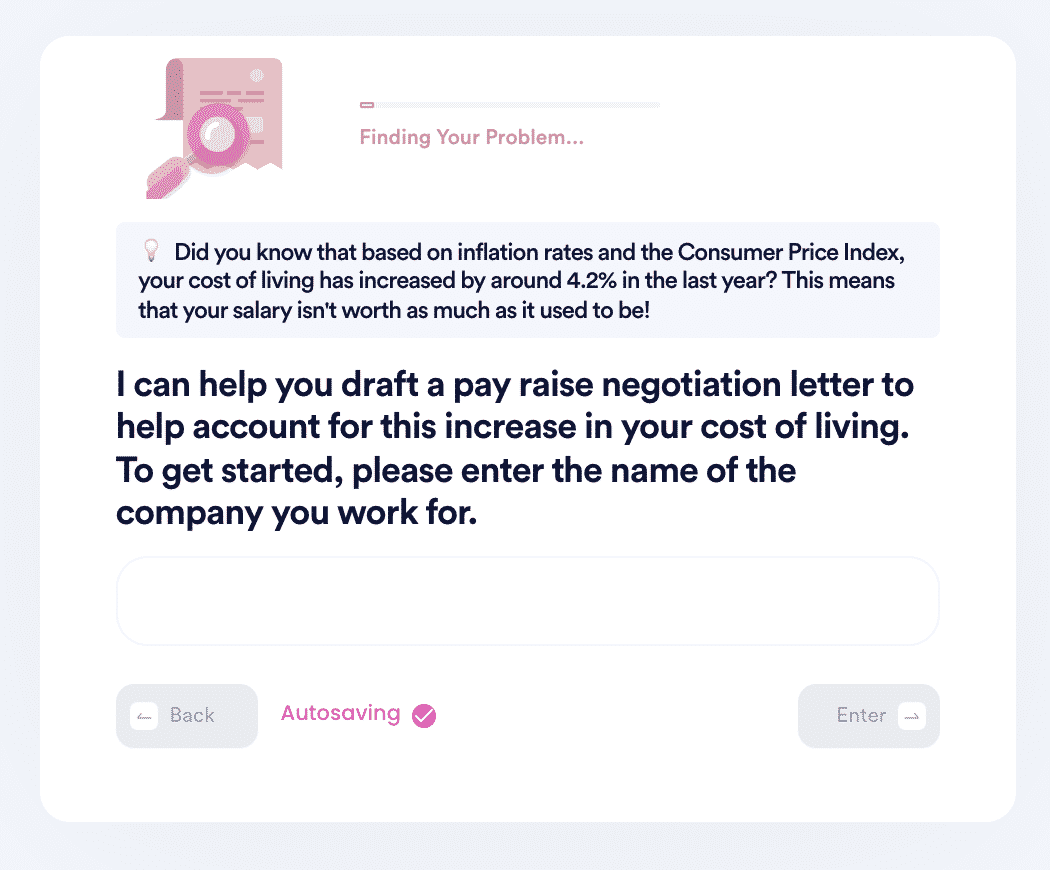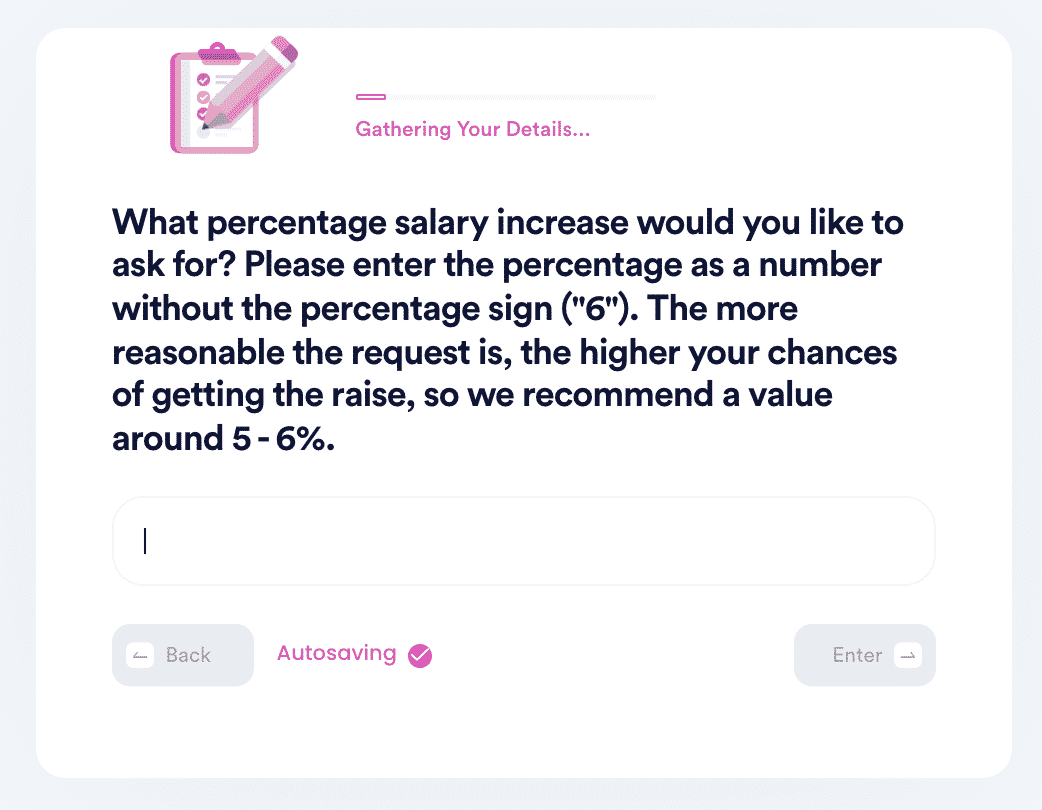How to Negotiate Salary Increase Performance Review
Are you hoping for a pay increase from your boss this year? Professionals are apprehensive about negotiations for various reasons, including concern about being viewed as aggressive or apprehension about the negotiating process.
With the help of DoNotPay, you will be able to write to your company a professional letter that asks for a in just a few simple steps.
How Often You Should Get a Raise
If you've just begun a job, wait at least six months before asking for a raise. If you've been in the company for a year or more, your employer is more likely to grant you a raise.
Additionally, you can ask once a year when you've worked for the company for a long time. If your boss wants to talk about , this "rule" may change. If that's the case, prepare your talking points ahead of time to maximize your advantage.
Reasons Why You Need a Pay Raise
Below are some of the reasons why you need to get a raise.
| You've been promoted. | Make sure you'll be paid more in the new role before accepting a promotion. You could be doing more work for the same income if you don't get a raise. |
| You've got additional obligations now. | As you progress within a company, you will most likely receive more complex duties or responsibilities than when you first started. If you are moving into a higher-level position, you should eventually get paid more. |
| You've been at the company for quite some time. | Employers must provide competitive wages to keep you on board. As the cost of living continues to rise, so should your pay. Your boss should evaluate how much anyone in your position should be paid regularly and modify your pay accordingly. |
Tips to Negotiate Salary Over the Phone
The following tips will help you as you negotiate salary over the phone:
- Don't commit to a number until you've seen the whole picture.
- Always be prepared.
- Continue to be thankful and respectful.
- Keep Emotional Reactions to a minimum.
- Never make a snap decision.
- Always ask questions.
- Always get something in writing.
Things to Avoid When Requesting for a Raise
Here are five things to avoid when requesting a raise.
- If at all possible, avoid asking over email.
- Don't ask during a stressful situation.
- If you don't want to lose your job, don't give an ultimatum.
- Don't utilize salary information from coworkers as a justification for a raise.
- Don't give out extra information about yourself.
How to Negotiate Salary Increase Performance Review on Your Own
Here is how to negotiate your salary on your own.
- Don't take the first offer.
Don't say "yes" too quickly while negotiating a job offer. Instead, inform the company that you require further time to consider the offer. Inquire with the employer if you can respond within the following 24 to 48 hours. During this period, sit down with the employment offer and assess whether it is reasonable. After making your selection, present your counteroffer to the company and prepare to negotiate a better wage.
- Don't be the first person to give out a phone number.
Waiting for the employer to make an offer is the art of salary negotiation. Don't say anything about your expected compensation unless the company specifically asks. The trick is to wait for the employer to present what they believe is a fair wage for your expertise and skills.
- Stay in control of your emotions.
Negotiating a salary might send you on a roller coaster of emotions. It can be frightening, stressful, exhilarating, or annoying. Maintain a positive attitude and remain professional during the pay negotiating process, no matter how difficult it becomes.
- Don't forget to bargain for more benefits.
Many job searchers ignore the additional advantages they'll receive as part of the job offer throughout the bargaining process. Instead of focusing simply on the wage, consider other benefits such as health insurance, a sign-on bonus, paid vacation time, and the ability to work from home. If you can't guarantee a better income, a company will probably offer you more benefits.
- Strike a balance between your value and what the employer can provide.
Knowing what you're worth and what the company can offer is the most crucial rule of pay negotiation. The last thing you want to do is ask for a raise in pay and perks without first doing your homework.
Solve the Salary Increase Performance Review With the Help of DoNotPay
Think about how convenient it would be if you could bypass the entire process of scheduling meetings and sending letters to discuss your salary rise and performance review. You should try DoNotPay's new salary negotiation option.
It’s easy. Just answer a few questions about , and DoNotPay will prepare a demand letter on your behalf to send to the human resource manager or general manager, requesting that your compensation be reviewed.
How to negotiate your salary using DoNotPay:
If you're not sure where to begin when it comes to reviewing your and compensation increases, DoNotPay has you covered in four simple steps:
All you have to do is:
- Search “negotiate my salary” on DoNotPay.

- Enter the name of your company and the industry you work in, so we can find the right wage statistics for your role.

- Answer a series of questions regarding your qualifications and achievements, relocation expenses, and other job offers if applicable.

- Enter the new base salary you would like to request.

That's all there is to it. DoNotPay will develop an official pay negotiation letter that you may email or give to your company once the information is finalized.
What Else Can DoNotPay Solve?
DoNotPay offers a variety of internet services aimed at making your life easier. You provide the data, and the internet service takes care of the rest. DoNotPay will help you save time and money when filing documentation or receiving a refund. Some content series that you could visit include:
- Reducing property taxes
- Canceling services
- Discrimination at work
- Chargebacks and refunds


